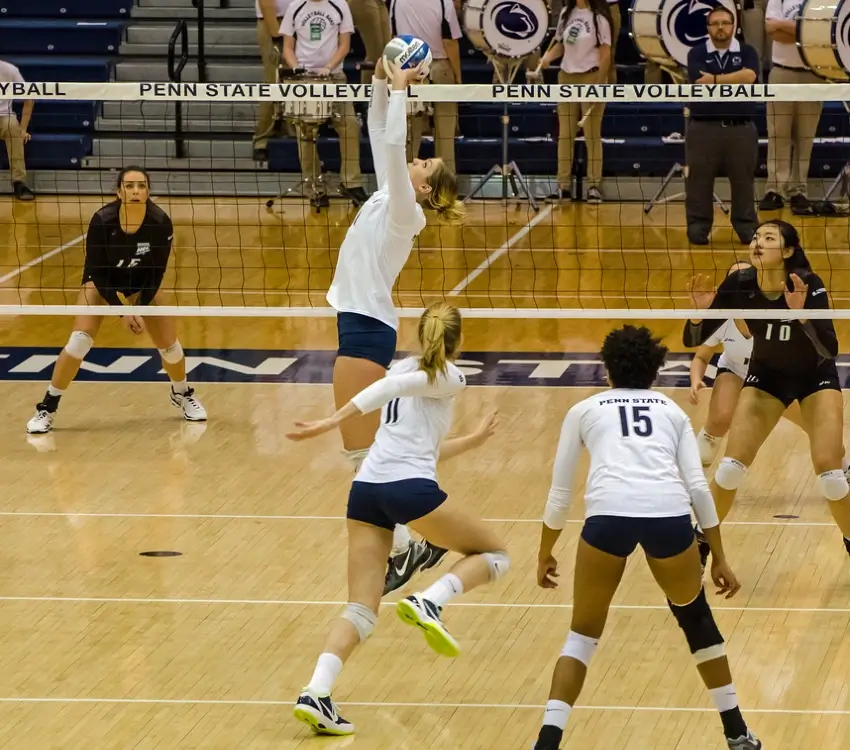Last Updated: November 24, 2023
For a volleyball team to succeed, combined effort by all the players is mandatory. This makes it difficult for someone outside the court to pinpoint a particular player to carry the day.
Narrowing down, the setter contacts the ball most, and their input is highly valued in coordinating a team’s offense. When training, the setter should receive more coaching than other players because of the critical nature of their position.
The Mindset of a Superb Volleyball Setter

The setter can either break or build the passer’s confidence and, consequently, the hitter’s ability to contact the ball. For this pivotal role to be successful, a setter should not only be good in physical skills but also develop key mental attributes, as outlined below.
Unwavering Confidence
Like any sport, success in volleyball can’t be achieved without confidence. A setter should maintain confidence in their abilities even when facing challenging opponents or undergoing a personal slump. A confident setter radiates an empowering yet positive environment to the other players.
Be Composed
Being composed even when faced with tough competition is an essential attribute for a setter. The setter should communicate effectively with teammates, make wise decisions, and deliver good sets.
A calm setter instills confidence in the whole team and can positively change the match’s outcome. Even if you make a mistake as a setter, stay calm and learn from it.
Volleyball IQ
Though volleyball explores a player’s physical ability, their mental IQ in the game is needed for success. A setter with deep volleyball understanding can read defenses, anticipate plays, and make smart decisions. This goes beyond the mentioned technical skills to learning opponent strategies and exploring the team’s dynamics.
So, smart setters are vital in a team’s defensive and offensive aspects.
Recommended read: Setting Standards High: Trends and Innovations in Volleyball Setting
Be Focused
Despite their position, a volleyball player should focus on the activities on the court and shun from external distractions. If a setter stays focused, they can read their opponent’s defense, make quick decisions or precise placement, and adapt to different game situations.
Generally, a focused setter leads their team to exploit the opposing team’s weakness and finally succeed.
High intelligence
A setter should be able to interpret their coach’s wishes and make quick decisions on the floor. They should also gather feedback or reactions from other players and translate them into workable actions.
Above all, the setter should watch how the game develops, analyze the opponent’s weaknesses, and advise the hitter on the possible target areas.
Be Adaptive and Creative
A setter should adjust accordingly to all ball situations, setting from an unstable position, developing a deceptive play, or adjusting to tight blocks. For a team to develop a good offense, the players should limit themselves to their abilities and, most importantly, to that of the setter. Therefore, a setter should use tactics they have practiced with team members and not perform new skills that can bring confusion.
Also read: Acing the Art of Timing: How Setters Create Opportunities for Scorers
Although it’s good to be creative as a setter, this is great for confusing your opponents; make sure that you deliver a hittable ball. This is because setting a ball that’s too high or too low for the hitter to make contact is worthless. It’s advised that a setter develops new tactics during training with team members and under the direction of the coach for more inclusivity.
Accept Mistakes
A good setter is ready to perform bold plays, is a risk taker, and corrects their mistakes quickly. A setter should remember that all successful kills a hitter makes result from their great sets, and all hitting errors result from poor sets. Thus, the setter should take responsibility for their actions, respond to feedback from hitters, and change accordingly.
Be Emotionally Stable
There are actions on the court that can upset a setter, like not making a good set or being criticized by fellow players or the coach. Nevertheless, the setter should never exhibit dramatic emotions when faced with challenges, which can affect the team negatively. Always be positive in each play, whether your team gets a score or loses.
Despite the physical traits or body size, the setter should understand their position. The setter should also follow the coach’s instructions for making effective setting choices. A good set should be hittable, which the setter knows the attacker can hit in any situation.
Related: The Dynamic Role of Setters in Modern Volleyball
Conclusion
A team’s offense should play within their skills and abilities, specifically those of the setter. The setter, in turn, should play within their powers and not explore unfamiliar tactics in the match but only when in training sessions, as this can derail the team’s confidence or momentum.
A setter should be completely oriented to all other players’ positions on the court and know their correct positions before setting the ball. Regular training and drills with fellow team members will help you to be the best setter. You should combine your physical skills with the qualities that define top setters and drive your team to success.
